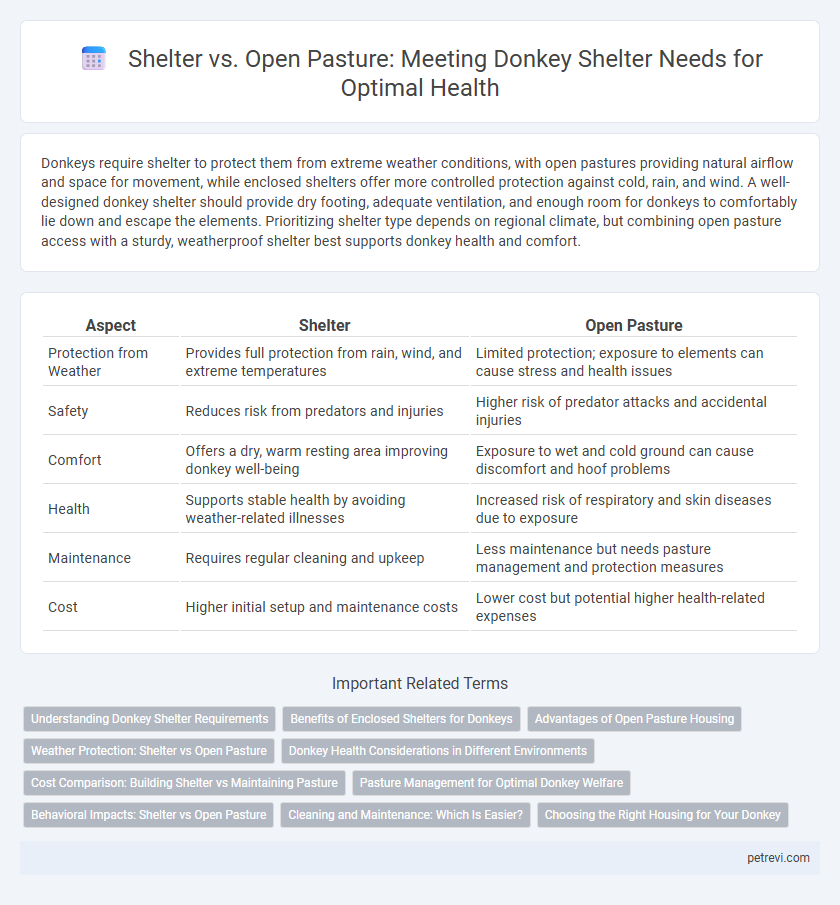Donkeys require shelter to protect them from extreme weather conditions, with open pastures providing natural airflow and space for movement, while enclosed shelters offer more controlled protection against cold, rain, and wind. A well-designed donkey shelter should provide dry footing, adequate ventilation, and enough room for donkeys to comfortably lie down and escape the elements. Prioritizing shelter type depends on regional climate, but combining open pasture access with a sturdy, weatherproof shelter best supports donkey health and comfort.
Table of Comparison
| Aspect | Shelter | Open Pasture |
|---|---|---|
| Protection from Weather | Provides full protection from rain, wind, and extreme temperatures | Limited protection; exposure to elements can cause stress and health issues |
| Safety | Reduces risk from predators and injuries | Higher risk of predator attacks and accidental injuries |
| Comfort | Offers a dry, warm resting area improving donkey well-being | Exposure to wet and cold ground can cause discomfort and hoof problems |
| Health | Supports stable health by avoiding weather-related illnesses | Increased risk of respiratory and skin diseases due to exposure |
| Maintenance | Requires regular cleaning and upkeep | Less maintenance but needs pasture management and protection measures |
| Cost | Higher initial setup and maintenance costs | Lower cost but potential higher health-related expenses |
Understanding Donkey Shelter Requirements
Donkeys require shelter that protects them from extreme weather conditions, including intense sun, heavy rain, and cold winds, making a well-ventilated, sturdy structure essential for their health. Open pastures provide natural grazing and exercise but must be complemented by shaded areas or a dedicated shelter to prevent heat stress and shelter from adverse weather. Proper shelter design considers airflow, drainage, and safety to meet the specific physiological and behavioral needs of donkeys.
Benefits of Enclosed Shelters for Donkeys
Enclosed shelters provide donkeys with vital protection from extreme weather conditions such as rain, wind, and intense sun, reducing the risk of illness and stress. These shelters create a controlled environment that enhances comfort and safety, particularly during winter months when temperatures drop significantly. Enclosed spaces also minimize exposure to predators and insects, ensuring overall health and well-being for donkeys.
Advantages of Open Pasture Housing
Open pasture housing provides donkeys with ample space to roam, promoting natural behavior and physical activity essential for their health. Exposure to fresh air and natural sunlight in open pastures supports respiratory health and vitamin D synthesis, reducing the risk of illness. The varied terrain and vegetation available in pasture environments also encourage natural foraging, contributing to a balanced diet and mental stimulation.
Weather Protection: Shelter vs Open Pasture
Donkeys require shelter that provides protection from extreme weather conditions such as intense sun, heavy rain, and strong winds, which open pastures typically cannot offer. A dedicated shelter with solid walls and a roof maintains a stable microclimate, reducing the risk of heat stress and hypothermia. Properly designed shelters also help manage humidity and prevent exposure to cold drafts, ensuring donkey health and comfort year-round.
Donkey Health Considerations in Different Environments
Donkeys require shelter that protects them from extreme weather conditions such as intense sun, heavy rain, and freezing temperatures to maintain optimal health and prevent stress-related illnesses. Open pasture environments provide natural grazing opportunities and exercise but must be supplemented with adequate shade, windbreaks, and dry resting areas to avoid issues like heat exhaustion or respiratory problems. Ensuring access to clean water and regular health monitoring in both shelter and open pasture settings promotes overall well-being and reduces the risk of parasitic infections and hoof diseases.
Cost Comparison: Building Shelter vs Maintaining Pasture
Constructing a dedicated donkey shelter typically involves higher initial costs due to materials and labor, but provides controlled protection from extreme weather and reduces long-term health expenses. Maintaining an open pasture incurs ongoing costs for fencing, regular grazing management, and potential supplemental feeding during adverse conditions, which can accumulate over time. Evaluating long-term investment versus ongoing maintenance expenses is essential for cost-effective donkey shelter planning.
Pasture Management for Optimal Donkey Welfare
Effective pasture management enhances donkey welfare by providing a balanced environment that meets shelter needs while promoting natural behaviors. Rotational grazing and maintaining adequate forage quality prevent pasture overuse and support healthy nutrition, reducing stress and the risk of hoof problems. Incorporating shaded areas or natural windbreaks within open pastures offers essential protection from extreme weather, aligning with donkeys' adaptive shelter requirements.
Behavioral Impacts: Shelter vs Open Pasture
Donkeys exhibit reduced stress levels and increased comfort when provided with adequate shelter, as it protects them from extreme weather and predators, supporting natural behaviors such as resting and social interaction. Open pastures expose donkeys to fluctuating environmental conditions, potentially causing anxiety, decreased forage intake, and altered social dynamics due to increased vigilance. Behavioral studies confirm that shelter availability directly influences donkey welfare by promoting stable routines and minimizing exposure-related stress responses.
Cleaning and Maintenance: Which Is Easier?
Open pastures require minimal cleaning as natural elements disperse waste, reducing maintenance frequency compared to enclosed shelters that demand regular mucking and bedding replacement to prevent odor and disease. Enclosed shelters accumulate manure and urine more quickly, necessitating daily cleaning routines to maintain hygiene and air quality for donkey health. Proper ventilation and easy-to-clean surfaces in shelters can simplify upkeep, but overall, open pastures offer lower cleaning and maintenance efforts.
Choosing the Right Housing for Your Donkey
Donkeys require sturdy shelter to protect them from extreme weather conditions such as intense heat, cold, and rain, while open pastures provide essential space for exercise and grazing. Optimal donkey housing includes a three-sided shelter with a solid roof to ensure adequate ventilation and dry bedding. Properly balancing shelter and open pasture access supports donkeys' health, comfort, and overall well-being.
Shelter vs Open pasture for Donkey Shelter Needs Infographic

 petrevi.com
petrevi.com